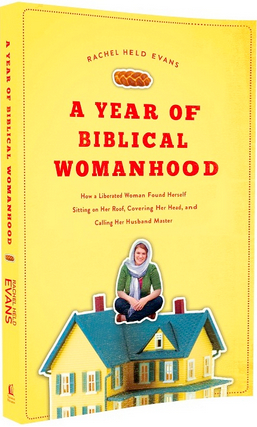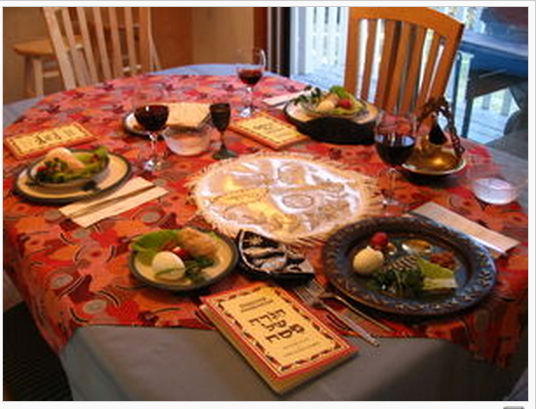This evening my alma mater, Eastern Mennonite University, is hosting author Rachel Held Evans, one of the foremost thinkers and writers in evangelical circles today who has appeared on Oprah and The View and spotlighted by NPR, the BBC and The Washington Post. Her spell-binding book will stir you to see women, biblical and otherwise, in a new light.
If your comfort zone is just too cozy to leave right now, you can read about a gutsy woman who ditched her comfy life-style, visiting “an Amish schoolhouse in Gap, Pennsylvania; a pig farm in Cochabamba, Bolivia; and a Benedictine monastery in Cullman, Alabama.” Admitting to being domestically challenged, she took up knitting and baking even working her way through the recipes in Martha Stewart’s Cooking School.
Rachel Held Evans characterizes herself as a liberated woman, but for one year she became an Old Testament woman who admits she “spent an afternoon on my rooftop, adopted a computer-baby, camped out in my front yard during my period,” and left eight pounds of dough to rise in my bathroom.”
Intrigued by many of her friends who abandoned their careers for traditional gender roles in the home, “Evans decided to try it for herself, vowing to take all of the Bible’s instructions for women as literally as possible for a year,” sometimes pushing them to their literal extreme. The result is A Year of Biblical Womanhood: How a Liberated Woman Found Herself Sitting on Her Roof, Covering Her Head, and Calling Her Husband “Master,” a New York Times best-seller.
Each chapter records a month in which Evans focuses on a biblical virtue: October – gentleness, November – Domesticity, and so on.There is nothing starchy about her subtitles with chapters like February/Beauty “My Breasts are Like Towers” and March/Modesty “Hula-Hooping with the Amish,” who she mentions don’t wear white for their weddings because it’s worldly and don’t marry in June because that’s worldly too!
The end of each chapter “month” features a character study of women like Eve or Mary Magdalene, but includes more obscure women like Junia, the Apostle or Huldah, the Prophet. That’s where Evans’ astute scholarship is most evident. With two unanswered questions, author Evans plunges into astonishing biblical research as her 8 pages of documentation verify: What does God truly expect of women? Is there a prescription for biblical womanhood? She admits:
I took my research way too seriously, combing through feminist, conservative, and liberal commentaries, and seeking out Jewish, Catholic, and Protestant perspectives on each issue. I spoke with modern-day women practicing ancient biblical mandates in their own lives—a polygamist, a pastor, a Quiverfull daughter, an Orthodox Jew, an Amish grandmother. I scoured the Bible, cover to cover, isolating and examining every verse I could find about mothers, daughters widows, wives, concubines, queens, prophetesses, and prostitutes.
But Rachel had divine help along her pathway: Ahava, an orthodox Jew she met online who advised Rachel on all things Jewish. Guys in the food aisles at a Wal-Mart in East Tennessee who helped her search for Kosher ingredients for her Seder celebration. And her ever-accommodating husband Dan, whom she praises with a home-made sign at the city gates of Dayton, Tennessee, near where they live.
Evans’ book is definitely a page-turner. I read her 310-page book in under 3 days. As one reviewer exclaims; “An unexpected, laugh-out-loud then turn the page and tear up, enjoyable and poignant read.” Another agrees that Rachel Evans tackles “the most sacred cows, willing to ask the trickiest questions” and observing fresh perspectives. For example, she reminds readers that it took the defiance of two queens to save the Jews—Esther by appearing before the king, Vashti by refusing to.”
Her website: www.rachelheldevans.com
Eschewing the traditional interpretation of Proverbs 31 that yokes most women with unreachable goals, Evans strives instead to be more like the Hebrew Eschet chayil, woman of valor, at its core a blessing to invoke, not a title to be earned. “plain and fancy” observation
What do you think of author Evans’ experiment? Its outcomes?
Your thoughts added to mine can launch an animated conversation!




My interest peaked when I read the reference to the Prophetess Huldah. One of my favorite \”tucked away\” women in the OT. Hidden away, but attested to the genuiness of \”the book.\” Like Esther, she was ready and available to step up for the Kingdom of God. Oh to be such a woman. This book is a MUST read for me. Thanks Marian.
As a student of the Bible, you will definitely relate to the women showcased at the end of each chapter. And Rachel\’s antics–well, just say you can relate to her gutsy, no-holds-barred approach to life.
This book sounds fascinating. I\’m going to add it to my list of \”to reads\” too. I\’ve seen many young women, new mothers, struggle with the challenges of balancing careers with motherhood and observed a subtle shift toward them setting clearer boundaries around home and family time. Perhaps we allowed the pendulum to swing too far in favour of career in the past and a correction is happening. I don\’t know. I do know that women face unique challenges and are faced with complex choices these days. Thanks for bringing this book to our attention, Marian.
Now that you are fully settled into your Canadian nest, you can savor reading. Reading was # 1 on my list of things to savor in retirement. Now I am so busy writing and keeping up on online I have to intentionally schedule reading time. Even my New Yorkers are some times unread several issues in arrears.
Thank you for your comments about the boundaries women struggle with and the shifting pendulum. You mention a correction may be happening now, which sounds plausible when reviewing past decades of women\’s choices.
I\’ve been aware of Rachel Held Evans out of my peripheral vision for the last few years and have appreciated her blog posts. I am going to post this blog in the MennoNerds group on Facebook. You might want to check out the group, Marian. It\’s a conversation area for a wide range of evangelical, Anabaptist, mainline protestants and others who are trying to understand contemporary faith through the lense of Jesus and early Anabaptists. I\’ll be going to the lecture tonight and can report back!
The work of Rachel Held Evans is new to me. Only our Alumni News made me aware of her creative mind and great work. I am familiar with MennoNerds and I think I may have subscribed (followed?) in the past but must check on that. I\’m a nerd, but I\’m not sure I would qualify as a MennoNerd–ha!
Do report back on the lecture this evening. I would surely love to attend, but your report will make it seem like being there, I\’m sure. Thank you!
I haven\’t yet read the book, and I\’m grateful, Marian, that you have read it and are sharing your thoughts.
I love that Ms Held Evans connects her active quest with the Bible and especially with the women of the Bible. I am excited that her search connected her with both Jewish and Christian folks of faith. I hope she helps all of us hear the Bible in a new way.
Thanks again for noticing and weighing in. I\’d love do hear what you think of the book after you have read it. It would be a wonderful book club choice, for sure.
I like anyone who takes her faith seriously enough to turn her world inside out in order to know God even a fraction better than before. Such courage and relentless passion honors Him.
That\’s profound, Traci. Courageous and passionate are two words I would definitely use to describe Rachel. This book entertains, informs, and above all, inspires the reader to follow Christ more closely.
Marian – How darn COOL is that?! I love your description. Reading 310 pages in less than 3 days is a great recommendation. So much so, that I\’ve added \”A Year of Biblical Womanhood\” to my reading list. Thank you!
This woman has loads of chutzpah, just like you, Laurie! Let me know what you think when you finish reading the book.
Sounds like a really good read.
If you like observing the experimental life in action, this is the book for you, Fiona.
Thanks for sharing the information about this book; I definitely want to read it now!
I am honored that you were motivated to read this book from the review. Also, I appreciate that you obviously don\’t miss a blog post, judging from all the \”likes\” in my column. Thank you, thank you, dear Rebecca!
I heard Rachel last night at EMU. She\’s lively, funny, and very very smart. You would have loved her.
Nice to hear from you again, Shirley. The lively, funny, and smart comes through in Rachel\’s writing. I\’m glad you were able to see her as a real live wire! Do you live close to Harrisonburg now?
Not yet, Marian–we\’re building. A bunch of our grandchildren live near.
I do want to read this book. Imagine someone intentionally living the OT and NT as she did. I don\’t think I need to intentionally follow suit as she did because in just living life, I have experienced an Esther and Sarah moment deeply personal and filled with meaning for me. Esther has to be my favorite, yet Sarah finally giving birth ranks up there with me, too. Having experienced infertility for five years, the birth of both daughters were miracles for me. And then when administrators in my district identified me to present workshops on multicultural education, I met resistance, in subtle ways was shunned, was used as a lightening rod for change that had to happen in our small district. I never feared for my job as I was supported fully by my visionary administrators, but I certainly worried about my family and the repercussions they felt. I do want to read this book you review as Evans sounds sincere and spirited.